Top 10 Best Football Players of the 1970s

The 1970s saw football transition from its traditional roots to a modern, televised spectacle. This decade showcased players who combined technical brilliance with physical prowess, leaving an indelible mark on the sport. With European club competitions and World Cups serving as the grandest of stages, numerous legends emerged. Here are the ten players from the '70s who truly shaped football's landscape during this period.
1. Pelé
Although Pelé's career began in the late '50s, he continued to dazzle in the '70s, leading Brazil to their third World Cup title in 1970. His skill, vision, and unmatched goal-scoring ability made him arguably the greatest footballer of all time.
2. Johan Cruyff
Cruyff didn't just play football; he philosophized it. The Dutch maestro's influence at Ajax and Barcelona laid the foundation for modern football tactics. His "Total Football" approach with the Netherlands saw them reach the World Cup final in 1974.
3. Franz Beckenbauer
"Der Kaiser" was a symbol of elegance on the ball. Beckenbauer's transition from midfield to defence at Bayern Munich and the German national team showcased his versatility and leadership. He lifted the World Cup as captain in 1974 and as a manager in 1990.
4. Gerd Müller
Known as "Der Bomber", Müller's predatory instincts made him one of the most lethal strikers ever. His crucial goals for West Germany and record-breaking feats for Bayern Munich solidified his place as a '70s icon.
5. Eusébio
While Eusébio's prime might have been in the late '60s, his impact on the game carried well into the '70s. His agility, power, and incredible shot accuracy kept him as one of the sport's premier forwards.
6. Roberto Rivelino
With a mustache as iconic as his left foot, Rivelino's dazzling dribbles and thunderbolt free-kicks made him an instrumental figure in Brazil's 1970 World Cup-winning squad.
7. Giacinto Facchetti
Inter Milan's legendary left-back, Facchetti revolutionized the full-back role. His ability to contribute both defensively and offensively set a precedent for future generations.
8. Dino Zoff
Consistency personified, Zoff set an unbeaten record with the Italian national team that lasted 1,142 minutes. His command in goal was pivotal for Italy throughout the decade.
9. Bobby Moore
While Moore lifted the World Cup for England in 1966, his influence as a steadfast defender and leader extended into the '70s, where he continued to be the bedrock for both West Ham and England.
10. Teófilo Cubillas
The Peruvian maestro, often referred to as "Nene", was known for his skillful play and exceptional scoring ability. His performances in the 1970 and 1978 World Cups showcased his talent on the global stage.
In conclusion, the 1970s was a golden chapter in the footballing storybook. The players from this era not only redefined their positions but also set benchmarks for the future. Their legacy remains a testament to a decade where football transitioned, evolved, and reached new pinnacles of brilliance.